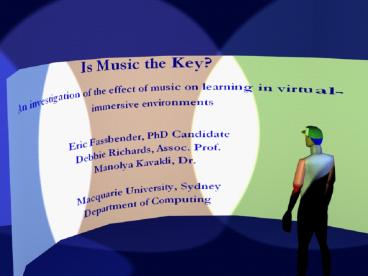Is Music the Key PowerPoint PPT Presentation
1 / 11
Title: Is Music the Key
1
- Is Music the Key?
- An investigation of the effect of music on
learning in virtual-immersive environments - Eric Fassbender, PhD Candidate
- Debbie Richards, Assoc. Prof.
- Manolya Kavakli, Dr.
- Macquarie University, Sydney
- Department of Computing
2
Is Music the Key? An investigation of the effect
of music on learning in virtual-immersive
environments
Overview
- Use cases of Music and Virtual Environments
- Beneficial Brain Wave Patterns for Learning
- Instrumental music frees Brain Capacity?
- Music in Games
- Modification of an existing Game Engine in order
to create a 3 dimensional Adventure Course for
Learning - Test-Setup Effect of Music on Learning in
Virtual-Immersive Environments
3
Is Music the Key? An investigation of the effect
of music on learning in virtual-immersive
environments
Use cases of Music and Virtual Environments
- Music as part of the curriculum
- Lozanov Suggestopedy - Language Learning
- Rauscher, Shaw, et al. - Mozart Effect
- Socrates, Aristotle
- Therapeutic use of Music
- Treat Stress or Alcohol Addiction
- Tomatis Electronic Ear for Treatment of Opera
Singers, Attention Deficit Hyperactivity Disorder
(ADHD) - Therapeutic use of Virtual Reality
- Pain relief for children with burns
- Rizzo Assessment of ADHD
4
Is Music the Key? An investigation of the effect
of music on learning in virtual-immersive
environments
Beneficial Brain Wave Patterns for Learning
- 12 35 Hertz (cycles per minute)
- Arduous Work, Stress
- 8 12 Hertz
- Relaxed Alertness(Dryden and Vos, 2001)
- 4 7 Hertz
- "twilight zone between being fully awake and
fully asleep" (Dryden and Vos, 2001) - 0.5 3 Hertz
- Deep Sleep
Source Dryden and Vos (2001)
5
Is Music the Key? An investigation of the effect
of music on learning in virtual-immersive
environments
Lozanovs Findings
- 416 students
- 600-900 words in a foreign language
- 93.16 remembrance the following day
- Introduction
- Artistic and Didactic songs in relation to topic
- Active Concert'
- learning matter is read to the student arranged
around a story line - Mozart, Beethoven, Brahms, Tchaikovsky
- Passive Concert'
- learning matter is read to the student a second
time - Bach, Vivaldi, Corelli and Telemann
- Music in 4/4 time
- 50 - 70 beats per minute
Source Lozanov (1992)
6
Is Music the Key? An investigation of the effect
of music on learning in virtual-immersive
environments
Instrumental Music frees Brain Capacity?
- Study - McFarland and Kennison
- Solve a tactual maze with either right or left
hand while listening to music on right, left or
both ears - Left Ear - Right Hand condition (14.75 mean
trials) - Binaural Listening, Left Hand used 23.17 mean
trials - Binaural Listening, Right Hand used 13.13 mean
trials) - Intrahemispheric and Interhemispheric
Competition'
Source McFarland and Kennison (1988)
7
Is Music the Key? An investigation of the effect
of music on learning in virtual-immersive
environments
Music in Games
- Massive Multiplayer Online Role Playing Game
(MMORPG) - Ultima Online
- Lineage 2
- Everquest
- Guild wars
- World of Warcraft 6 Million Online Gamers
- Role Playing Game The Elder Scrolls IV -
Oblivion
8
Is Music the Key? An investigation of the effect
of music on learning in virtual-immersive
environments
Test-Setup
9
Is Music the Key? An investigation of the effect
of music on learning in virtual-immersive
environments
Test-Scenario
- Historical 3D Course
- Macquarie Lighthouse
- Ambient music
- Classical music
- Rock/Pop music
- Didgeridoo music
- RAP music
- Silent conditions
- Nature sounds (e.g. crickets, ocean waves)
10
Is Music the Key? An investigation of the effect
of music on learning in virtual-immersive
environments
- References
- Rauscher, F.H., G.L. Shaw, and K.N. Ky (1993)
Music and spatial task performance. Nature,
365(6447) p. 611-611. - McFarland, R.A. and R.F. Kennison (1988)
Asymmetrical Effects of Music Upon
Spatial-Sequential Learning. Journal of General
Psychology, 115(3) p. 263. - Rizzo, A.A., et al. (2000) The Virtual Classroom
A Virtual Reality Environment for the Assessment
and Rehabilitation of Attention Deficits.
CyberPsychology Behavior, 3(3) p. 483-499. - Decker, F. (1999) Die neuen Methoden des Lernens,
Wuerzburg Lexika Verlag. - Aristotle (1885) The Politics, Vol 1, Translated
into English with analysis and introductions by
JOWETT, B., Oxford, Claredon Press. - Lozanov, G. (1992) Suggestology and Outlines of
Suggestopedy, Philadelphia, Gordon and Breach
Science Publishers. - Tomatis, A. (2005) The ear and the voice, Lanham,
Scarecrow Press Inc.
11
Is Music the Key? An investigation of the effect
of music on learning in virtual-immersive
environments
- www.VirSchool.com

